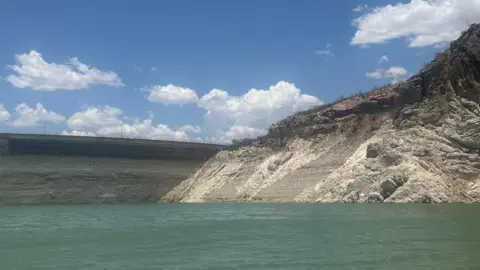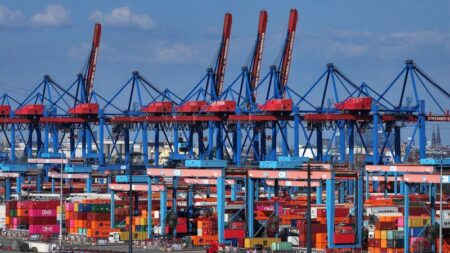In an ongoing debate over scarce water resources, a stark discord is emerging between the United States and Mexico, particularly affecting the state of Chihuahua. For thirty consecutive months, residents of San Francisco de Conchos have been enduring an alarming drought, propelling the community to seek divine intervention at Lake Toronto—the primary reservoir behind the region’s crucial La Boquilla dam. The lake has reached critically low levels, sending local farmers and families into despair as they witness their once-abundant water supply dwindle dramatically.
Rafael Betance, a vigilant water monitor for the state water authority for over three decades, laments the current state of Lake Toronto, noting that water levels are at 26.52 meters below the high-water mark and that the reservoir is less than 14% full. He remarks on the stark memories of when the lake was full, recalling its last overflow in 2017, and evokes the wish for rain from the heavens, as prayers echo on the parched earth.
The situation is aggravated by the backdrop of an intense discussion regarding water-sharing agreements between the United States and Mexico. Under the 1944 water-sharing treaty, Mexico is required to send approximately 430 million cubic meters of water annually from the Rio Grande to the United States. In return, the US supplies nearly 1.85 billion cubic meters from the Colorado River, predominantly for the needs of cities near the border, such as Tijuana and Mexicali. However, Mexico has struggled to adhere to its obligations of late, a situation that has incited controversy and mistrust across the border.
Republican lawmakers in Texas, under the Trump administration, were particularly vocal about withholding US water from the Colorado River if Mexico did not comply with its treaty obligations. Trump himself leveled accusations against Mexico for potentially “stealing” water and hinted at punitive measures such as tariffs and sanctions. In response, Mexican President Claudia Sheinbaum acknowledged Mexico’s water shortfall while adopting a diplomatic tone.
Despite recent transfers of 75 million cubic meters of water to the US, which remain just a fraction of Mexico’s overall owed supply, tensions have resurfaced. A confrontation in September 2020 at La Boquilla’s sluice gates resulted in fatalities, illustrating the heightened emotions tied to water-sharing disputes.
On the US side, farmers like Brian Jones, a fourth-generation agriculturalist in Texas’ Rio Grande Valley, feel aggrieved, stating that they are primarily fighting for what they believe is rightfully theirs under the treaty. He expresses frustration over being unable to irrigate his crops fully and accuses Mexican farmers of hoarding what he perceives should be shared resources.
However, Mexican farmers perceive the treaty differently, arguing that their obligation to send water depends on their capacity to meet local needs, an argument bolstered by the ongoing drought affecting their region. Some, like former mayor Jaime Ramirez from San Francisco de Conchos, have modernized their operations through more efficient irrigation methods but recognize that not all farmers can afford the transition.
As the drought continues and conditions worsen, both sides of the border are eyeing the future with trepidation. Many Mexican agriculturists believe that the 1944 treaty no longer serves its intended purpose, being ill-equipped to handle contemporary challenges such as climate change and population growth. Conversely, Texas farmers assert that the existing water-sharing agreement has proven to be an enduring framework worth preserving.
The fate of agriculture in Chihuahua hangs precariously; without adequate rainfall, farmers warn that water must be conserved for human consumption rather than agricultural use. For those like Betance, the remaining water in the Lake Toronto reservoir is heating rapidly, jeopardizing the local aquatic ecosystem and the tourism sector it once supported. The collective sentiment appears to circle back to the same desperate hope—that rain may finally descend upon this beleaguered land.











